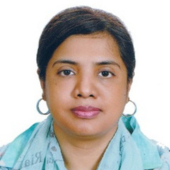Author: [AUTHOR] Published on 10/1/2025 12:00:00 AM
Elora Sharmin, MBBS, MD, MPH, Associate Professor, Bangabandhu Sheikh Mujib Medical University, Dhaka, Bangladesh
What does being a part of the Low-to-Middle-Income Country (LMIC) Accelerator mean to you?
Being part of the LMIC Accelerator is a powerful validation of the work being done in underrepresented regions like mine. It is an opportunity to raise the visibility of drug safety challenges in low-resource settings and to collaborate with global experts. This program has not only strengthened my leadership and research skills but also amplified my voice in the global clinical pharmacology community.
What professional accomplishment are you most proud of?
I am most proud of establishing the institutional pharmacovigilance center and developing mobile apps for ADR reporting, as well as formulating a consumer reporting form as friendly for consumers at Bangladesh Medical University in Bangladesh. It was a long-standing goal that required navigating limited resources, training healthcare professionals, and building institutional trust. Today, it plays a critical role in improving medication safety and monitoring adverse drug reactions nationally.
What is the most important leadership lesson you have learned the hard way?
One of the most important leadership lessons I have learned is that change takes time – and persistence. Advocacy for pharmacovigilance in a system that initially undervalued it taught me the importance of patience, resilience, and building coalitions. Leading with empathy and listening to different perspectives has helped transform resistance into collaboration.
Who has inspired you in your career?
I have been inspired by public health leaders and mentors who have committed their lives to addressing global inequities in health. Their work in translating science into impactful policies and practices in underserved regions has shown me what is possible when knowledge meets compassion and courage. As well as my husband, Dr. Sheikh Foyez Ahmed, and my colleague, Dr. Sharadindu Kanti Sinha, they are always encouraging me in every step and they also help me a lot.
What has been your favorite part of the LMIC Accelerator?
My favorite part of the LMIC Accelerator has been the opportunity to connect with a diverse network of professionals and leaders who share a common goal of promoting safer, more effective therapies across the global health systems. The program provided me with mentorship, access to leadership pathways, and exposure to collaborative opportunities that have elevated my confidence and capacity to drive change in resource-limited settings. I want to mention my mentor, selected by ASCPT, Dr. Thaddeus Grasela. I always admire him as I learn so many things from him, and he is one of the best mentors for me in my life, and it has only happened because I have been a part of the LMIC Accelerator Program.
What has been the greatest challenge in your career?
One of the greatest challenges has been building awareness and infrastructure for pharmacovigilance in a healthcare system where drug safety monitoring was not a priority. It required persistent advocacy, capacity building, and trust development to establish the first institutional pharmacovigilance center in Bangladesh. Overcoming systemic resistance and limited resources taught me resilience and the importance of sustained engagement. As well as being a woman researching in the background of pharmacology at every step. I have to show my effort and prove myself to show that women can.
Do you have a favorite tip or trick for clinical practice or research that you want to share with fellow members?
In low-resource settings, simplicity is powerful. One of the most effective tools I have implemented is a simplified adverse drug reaction (ADR) reporting form co-designed with frontline health workers. Making pharmacovigilance accessible through context-aware innovation ensures greater participation and long-term success. Listening to the end-users – patients and providers – has been my most valuable research tool. And always to be kind and polite to all the people in your working environment.
When you are not working, how do you spend your free time?
I enjoy reading scientific journals, especially stories of global health pioneers and memoirs that explore human resilience. I also love spending time with my family, mentoring students, and occasionally writing reflections on public health from a personal perspective.
What was your childhood dream job?
As a child, I dreamed of becoming a writer or journalist. I was always curious about people's stories and wanted to give a voice to underrepresented communities. Interestingly, that dream lives on in my scientific work through storytelling in research, advocacy, and education.
What is one thing people would be surprised to know about you?
People may be surprised to know that I can dance. Music has always been a grounding force in my life and helps me stay centered, especially during stressful times.
Dr. Sharmin has been a member of ASCPT since 2025.
